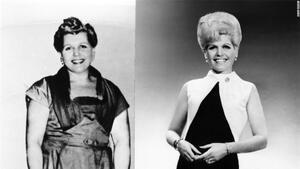Jean Nidetch, Diet Queen
Every woman in my family has been on a diet for as long as I can remember. Some of my earliest memories are of family parties: everyone surrounded by lovingly prepared dishes, saying “oh god, I shouldn’t eat this” and “I’m not eating carbs right now” as they piled their plates with lasagna and bread. That was the deal: diets weren’t really adhered to, but they were talked about incessantly.
Growing up, it seemed to me that my family of vivacious, resourceful women all carried the same shame about their weight and the unshakeable certainty that they would eventually be thinner. I’d known what “points” meant since I was in the single digits: points were assigned to different foods if you were on Weight Watchers, the diet that every woman in my family always seemed to be on, and too many points were “bad.” As I grew up and grew wary of what seemed to me like a rather exhausting enterprise, I turned my back on dieting and, more forcefully, on the diet-talk so rampant within my family. I was not going to be one of those women, no way.
Jean Nidetch was one of those women. In fact, as the founder of Weight Watchers, she was THE woman—the queen of women who talked about their weight with other women and were always on a diet.
Nidetch was an unhappy, overweight housewife in the 1950s. Like so many women, she would crash diet and then gain it back. Her yo-yo dieting came to a halt after a fateful trip to the grocery store, when a neighbor asked her “when she was due.” After that run-in, Nidetch lost 72 pounds and kept it off. Really kept it off—when she died this week at age 91, she weighed 142 pounds, a number she’d maintained since that initial weight loss in the early 1960s.
So how did a housewife turn a successful diet into a business empire? It began with a concept as Jewish as dieting: talking to other women. Finding herself desperately in need of moral support, Nidetch invited a group of friends, all also struggling with their weight, to meet weekly in her home and commiserate, advise, and bolster each other. Within two months, that group of six friends expanded to 40. Nidetch reached her goal weight, and drew up a business plan to go along with her diet plan. She strongly believed that the key to weight loss was psychological, and that meetings, for which Weight Watchers would become famous, were crucial. Women flocked to meetings, lost weight, and kept it off. Nidetch became a multi-millionaire, acted as the public face of the company, and wrote many cookbooks and memoirs.
It can be hard for women my age—women who identify as feminists, who preach body positivity, and who grew up frustrated by the obsessive body-talk of older generations—to celebrate Nidetch’s work. And yet, she was a hard-working woman who was savvy enough to turn a personal battle into a hugely successful business. She gave comfort and hope to millions of women and provided an outlet for women who had no one to turn to in their daily struggles. In a way, she gave women access to group therapy without stigma. Do I love that Nidetch invented the points system that I still know way too much about, having absorbed all of the rules by osmosis? No, not really. But I do value any woman smart enough to leverage the benefits of sharing personal stories to help women take control of their goals—and, okay, goal weights.







Thank you for your post, myself very happy to read it because it can give me more insight, thanks.
Thanks for this. I've been a WW member since my son was born 22 years ago; always wondered about Jean's back story.
For the record, Jean didn't invent the points system, which was introduced sometime in the late 90s. The original WeightWatchers from the early 60's was an "exchanges" program, where you had to eat categories of foods at each meal. For example, for breakfast you could choose: 1 egg *or* 1 ounce hard cheese *or* 2 ounces fish *or* 1/4 cup cottage *or* pot cheese AND
1 slice bread (No rolls, bagels, biscuits muffins, crackers, cereals, or special breads)
Thanks, Tara, for a thoughtful piece about an important role model. Nidetch needs to be remembered not only for what she accomplished personally, but as one of the first women to excel in the business world.